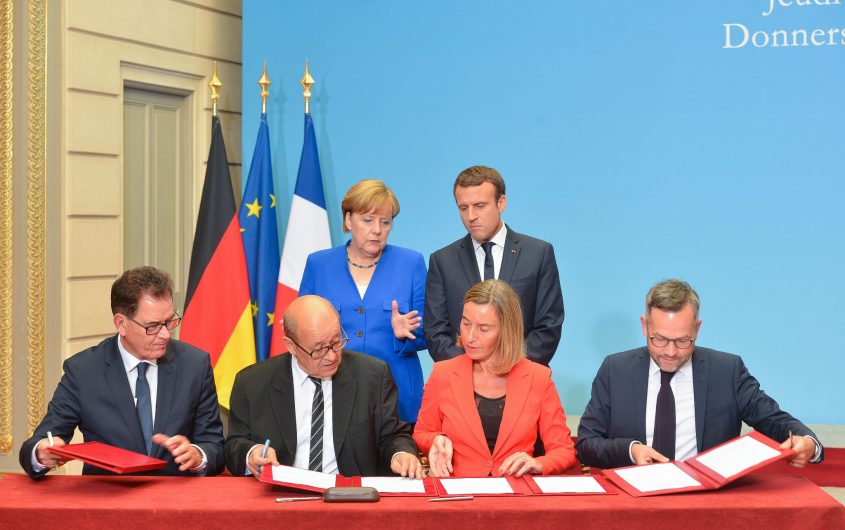
European External Action Service via Flickr
Keep Calm and Fill In the Gaps

Sven Hilgers
Otto-Suhr-Institute for Political Science, Freie Universität Berlin
Sven Hilgers is a member of the FDP's federal committee on international politics and chairman of the FDP Berlin’s committee on international and European politics. A board member of the FDP Berlin, he chaired the group that drafted the election manifesto for the upcoming state election in Berlin in September 2021. Among other things, he was vice president and international officer of the young liberals Germany (JuLis) and worked as an assistant for a liberal MP in the Bundestag. Beside his political work, Mr. Hilgers is manager globalization, free trade and market economy at the global themes unit of the Friedrich-Naumann-Foundation (FNF) in Berlin. Before joining the FNF, he was part of the research project on EU-IMF cooperation in the Eurozone at the Free University Berlin and the University of Hagen, where he analyzed the economic adjustment programs in Greece and Cyprus as well as the policies of the European Central Bank. His research has appeared in the Review of International Political Economy, West European Politics and New Political Economy. Mr. Hilgers studied political science and global studies in Berlin and Roskilde (Denmark). He holds an MA and BA in political science from Freie Universität Berlin, where he is pursuing his PhD.
He was a 2017-2018 participant in AICGS’ project “A German-American Dialogue of the Next Generation: Global Responsibility, Joint Engagement,” sponsored by the Transatlantik-Programm der Bundesrepublik Deutschland aus Mitteln des European Recovery Program (ERP) des Bundesministeriums für Wirtschaft und Energie (BMWi).
A thoughtful response and an ambitious European agenda are Germany’s best options for the Trump era
The world, America, and transatlantic relations have survived the first year of the Trump presidency. The global economy is still in good shape. Although Trump and his team are moving in a more hawkish direction, most global economic institutions continue to function well. The German government has reacted with caution and refrained from engaging in antagonistic rhetoric toward Trump’s administration. Taking a backseat, however, is not an option for Europe’s largest economy. The new German government would be well advised to strengthen communication on various levels, to offer cautious critique based on shared liberal values, and to coordinate with its European partners. Along with other EU member states, the German government has to actively seek dialogue with the U.S. administration and legislators. It has also to find new issues for closer cooperation such as a transatlantic approach on the risks and opportunities of new technologies like block chain.
But most importantly, the German government needs to step up its effort to fill in the institutional gaps of the European Union. That is not to say that Germany should turn its back on the U.S. and solely focus on the EU. Quite the opposite, a reformed EU may even have an added value for transatlantic relations. So far, Angela Merkel’s response to the reform proposals of French president Emmanuel Macron has been lukewarm. Whereas a cautious response to Trump might be appropriate, a wait-and-see strategy is the wrong answer to Macron’s agenda. The coalition agreement of the governing parties CDU and SPD features a reform-minded chapter on the future of the EU. However, Chancellor Merkel and her Social Democratic deputy, and minister of finance, Olaf Scholz, so far have failed to deliver on these commitments. In areas such as the Common Security and Defense Policy and trade, the German government seems at least to move in the right direction. But the fourth Merkel cabinet needs step up efforts on other issues. In terms of Eurozone reform, for example, the German government should commit to a compromise on the European Monetary Fund and the completion of the banking union prior to the European Council meeting in June. Especially the common backstop for the Single Resolution Fund and the European deposit insurance needs to be realized to mitigate the bank-state nexus and to improve the investment climate in Europe. A compromise could entail a credible plan to reduce non-performing loans on the balance sheet of banks in crisis-ridden member states and stricter rules for the enforcement of the bail-in procedure to diminish the risk of moral hazard.
Over the past seventy years, the United States has been supportive of European integration. Ever since the Marshall Plan, most U.S. presidents voiced general support of the EU and sometimes even requested further European integration. Donald Trump is the first president to openly question the added value of European cooperation. The ability to find effective European solutions for common challenges is the best way to demonstrate the effectiveness of European integration. Moreover, it may convince advocates of unilateralism in the Trump administration that multilateralism in general can and will deliver.







